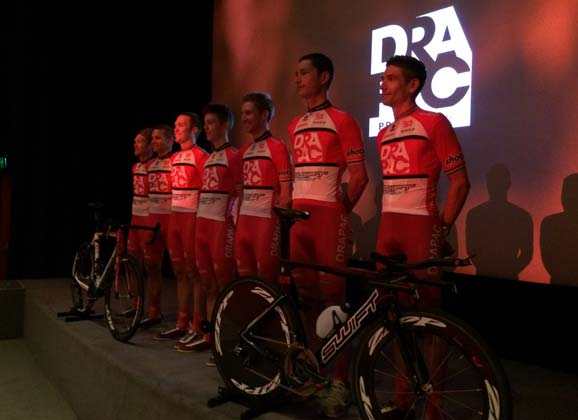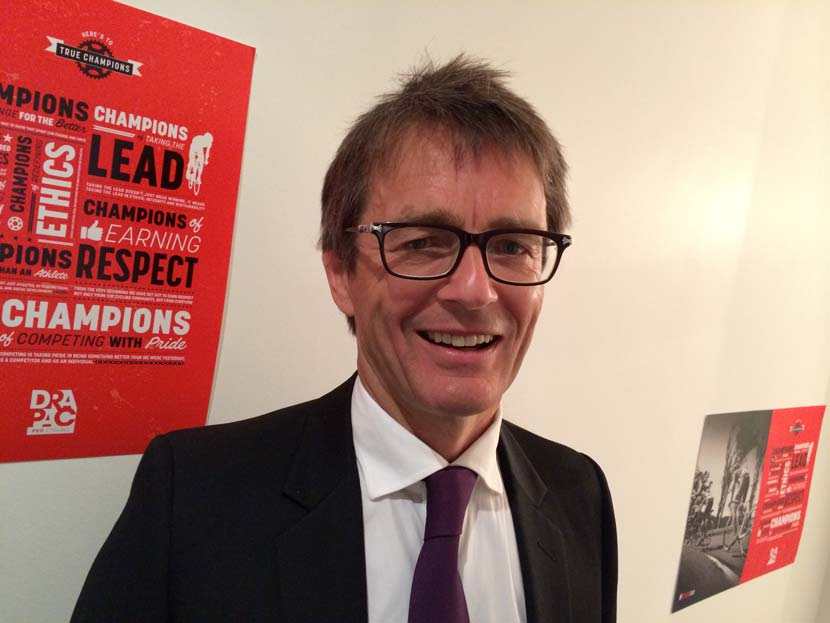
On the eve of the 2014 Tour Down Under, the Drapac Professional Cycling Team booked a cinema in Adelaide, dressed it up in red and introduced the riders for the Pro-Continental outfit to the media, sponsors and a few family members. The team’s benefactor, Michael Drapac (above) was running late but when he emerged at the front of the auditorium he was clearly emotional. He’s been a major sponsor of Australian cycling for over 10 years and has poured in millions of dollars into the sport in that time. He is passionate about what he does, very supportive of those on his side, highly opinionated on numerous topics, and not shy of expressing thoughts others may tend to bottle up.
Generally launches are about formalities, generating a positive vibe, explaining the ethos of the team – its hopes and ambitions. The Drapac function was no different. What did catch the attention of those in attendance, however, was the impassioned speech by Drapac which began with him admitting to “holding back tears” while he recognised that, finally, his team could be part of Australia’s biggest stage race.
His talk lasted over 17 minutes and while some points were repeated, Drapac wasn’t afraid of explaining his take on the AIS and others in the sporting fraternity that he didn’t believe had the best interests of all concerned in mind. The points he raised changed the event from being just another function into something quite remarkable: a true outpouring of emotion in advance of an anticipated rendezvous. Here is a transcript of Drapac’s speech…
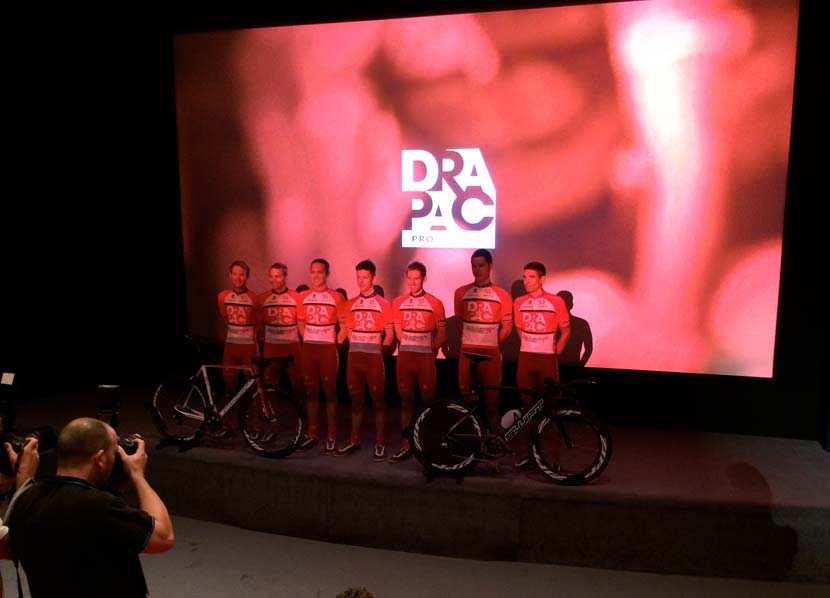
Michael Drapac – an emotional occasion
– A speech by Michael Drapac
“If you think about sport, let’s start with something we can all relate to – let’s think about business. We all know what business is about, we all are involved in business in some capacity, and if I ask you to think about… just pose this question: what’s a truly successful business look like?
“What does a business worthy of success look like? Is it someone who makes the most amount of money? We all know that’s not true.
“The most successful business is the business that has far greater metrics than just money in the bank.
“We all know true success – worthy success – has a whole lot of other metrics. Very simply, and it’s a discussion and a lecture in itself, good companies – admired companies – have a social responsibility agenda. They have ethics. They have programs for their staff. They are very committed to the well-being and the development of their staff. They have a sustainability agenda. And sustainability, I think, is very relevant in cycling.
“Sustainability is being fully aware and responsible for the full cost of what you do. But most importantly it’s about people. Good business ethics is about people and it’s about the community. So, is sport any different? Of course it’s no different. In fact, the whole purpose of sport if you want to look at the philosophy of sport is to enhance community – it’s actually to enhance our humanity.
“I think we’ve lost our way a little bit in the sense that the objective of sport is supposed to be subordinate to the objective of good citizenship, but it’s actually gone the other way around. I think the objective of good citizenship have been made subordinate to sport in many ways. But the wheels of change have come…
“For me, it’s always about good citizenship; it’s always about the people. It’s always about riding the bike for the fun of riding. And lastly, for a short period of time, an athlete is going to an elite sportsman. That might be five years or 10 years, and then he returns to society and he just ‘fits in’ like all the rest of us do.
“So what’s our philosophy?
“Perhaps to ground you, to give you some sort of baseline to think about – and I’ve been accused of a few things in the past – but our moral, our philosophy of sport, is very much driven by a number of things but I’ll give you a few that you can relate to.
“Very recently, late last year, 2013, the Olympic Games rewrote their charter and I’ll just read you the opening paragraph. This is what is says:
‘Olympism is a philosophy of life, exalting and combining in a balanced whole the qualities of body, will and mind. Blending sport with culture and education, Olympism seeks to create a way of life based on the joy of effort, the educational value of good example, social responsibility and respect for universal fundamental ethical principles.’
“That is the highest benchmark, that’s the Olympic Games commission.
“WADA, for those of you who don’t know, [that] stands for the World Anti-Doping Agency. They had a lot to say only a couple of years ago. ‘Sport,’ they say, ‘is a celebration of the human spirit, body and mind which is characterised by the following values: ethics, fair play and honesty, health, excellence in performance, character and education, fun and joy, teamwork, dedication and commitment, respect for rules and laws, respect for self and others participants, courage as well as community and solidarity.’
“I don’t think you get two better reference points than that.
“And so when I think about it and we look at it, there is a renaissance in sport. And there are lots of eminent sporting ethicists from Dr Pippa Grange to Gearoid Towey – and ex-Irish graduate from Dublin – and if we look at how sport is changing there is a renaissance.
“Look at how the AFL has changed and continues to change. They’ve got a multi-million dollar program just allocated to the development of athletes post-sport. The NRL too… and I had the priviledge of meeting one of the greatest, Robbie Kearns, and he said every club in Australia now has a very significant budget for developing the athlete outside the sport.
“If we look at business, [we see that] businesses have evolved. Every worthy business has a social responsibility agenda.
“The world is changing. And I think that we in sport have to change.
“I’ll digress a little bit and I’ll talk a little bit about the AIS – and I don’t want to spend too much time on this, but it’s worth saying something because very recently I was criticised by the head of the AIS, Matt Favier, for a couple of things I’ve said. Now, I was disappointed that he made it personal, but that’s okay.
“But I’m still shocked and I’m still appalled in the program at the AIS. They have clearly lost their way. And if you think about what I just said – what’s happening with the IOC and WADA and business and all these leading sporting codes – what’s happened to the AIS? It is clearly out of sync with what the rest of the world is doing.
“What I would say is that the idea that we are compassionately ruthless in the development of sport is… well, one negates the other.
“I don’t believe that anyone in the Australian government can possibly support a statement and a philosophy – if it’s called a philosophy, or a stated objective – that we are ‘compassionately ruthless’ or ‘ruthlessly compassionate’ towards developing young athletes. I don’t believe any Australian can support that. And I think, on reflection, Mr Favier will probably think that his views have to change.
“I am buoyed by his statement that we’ve got a long, long way to improve and I look forward to being a part of that – but that’s not for today.”
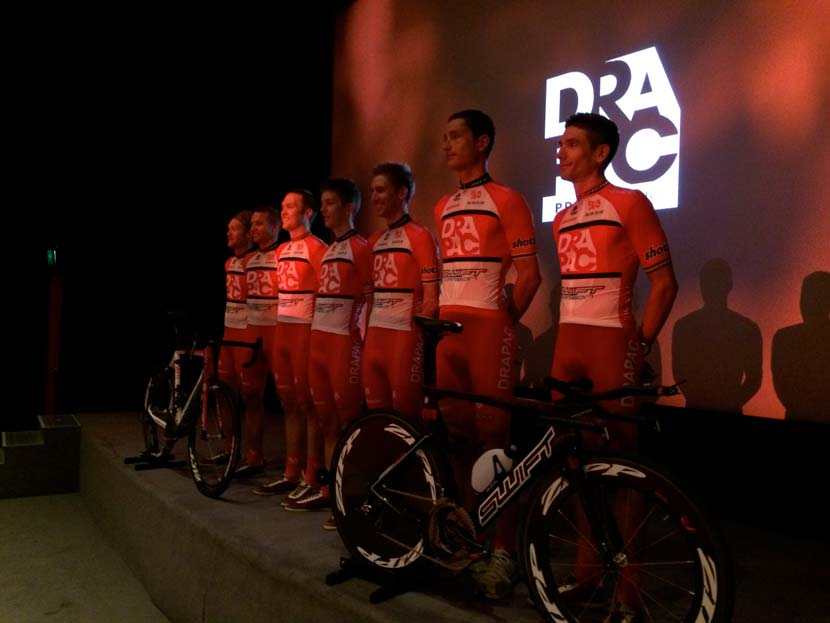
* * * * *
“Let’s talk a little bit about the Drapac philosophy. It’s drawn by not just me – I’m not reinventing the wheel, I’m only restating what probably the world’s most luminary groups or organisations in sport are stating, it just happens to be needed in cycling like never before.
“More specifically, I want you to think about this: the door of an athletes’ career closes… it’s more certain than death. It always comes. It’s inevitable: the door of elite sport closes! And it can close for any number of reasons.
“It can close because the athlete wasn’t good enough. It can close, god forbid, because of injury. It can close because, like some great athletes – like Robbie McEwen – the use-by date came to an end – or you just lose interest. But it is fundamental: the door of your sport must close.
“So, what does that mean?
“It means that there comes a point in time in the athlete’s career where they must transition and reintegrate back into the real world. They become sporting citizens for a short time but then they must become whole citizens.
“We in sport – everyone in sport – has a duty, a responsibility, to ensure that that difficult process, and it is a difficult process, of transitioning and reintegrating is as painless as possible. We need to invest the resources, the time and the real heart and soul into assisting those athletes. Otherwise we’ve just exploited them.
“And it still pains me why most athletes in this country are valued and celebrated if there’s a medal around their neck but if they don’t have a medal around their neck, they’re yesterday’s news.
“So, what does it mean?
“Well, it means that you need to value an athlete much more than just the medal around their neck. It’s much more than about the medal, it’s about people. It means that, as a team, we need to have values. We need to have ethics. We need to stop being seduced by this gold medal.
“Of course we want to make money. Of course we want to win bike races. Of course we want to sell advertising. But like all great companies you never subordinate your values and your ethics, you must maintain them. Just go back to the Olympic charter…
“We need to ensure that each of these athletes is acutely aware that one day the door of their sport will close. Everyone of these boys, I’ve told them, ‘You understand that, don’t you? What are you doing to prepare for that day?’
“Most sporting teams don’t have a lot of time for that because it’s all about win, win, win.
“I’m seeing two athletes next week who were with us years ago and I’m helping them on certain things. And so we need to invest resources, time, energy, commitment to give the riders the life skills, the career skills, just the awareness, and support them. Sure, we need to win bike races but we need to be there for them otherwise we’ll fail them.
“Don’t tell me that the richest business in the world that violated every human ethic and every environment ethic is a success. They are a failure! They fail.
“The man with the most amount of gold medals who is unethical, he fails!
“So our metrics must change. The metrics of success must change. We all know that.
“A simple analogy is one I like to call ‘the one legged table’: we understand that if you have a one legged table, there’s one pillar holding it up. If you think of it as a metaphor, the top of the table represents the athletes’ self esteem, their sense of self worth – how they feel about themselves, obviously. That leg comes off one day because when the door of their sport closes that leg is not there anymore so you need to build other dimensions, other pillars which support them as a worthwhile human being.
“More specifically, what does that mean? How do you develop these other dimensions? Well, you impress on the athlete the role of education. You impress on them about career development. You encourage them about the importance of having other interests and other hobbies. You get them to do community work. You get them to be part of the community. You get them to have social networks. All of these things represent other pillars so when that one leg – that big fat leg, the sport – is chopped down, you’ve got other pillars there holding you.
“Everyone in this room who was never an elite athlete, we all know what balance means.
“Balance means having other dimensions. Don’t be obsessed about one thing whether it be making money or being a student, you must have other dimensions to who you are.
“These athletes – these boys here – they have an opportunity. They are no longer a part of the problem. They have an opportunity to be part of the solution. They have the opportunity to be ambassadors for this change. And I think this is a great opportunity for us and I would hope that it would distinguish or differentiate us from others.
“There’s a much broader message that these boys can convey.
“A bike rider is a commuter first. And I was inspired by that many years ago. A bike rider reduces carbon emissions. A bike rider makes the roads safer. A bike rider increases the health of Australians.
“We’ve lost contact in becoming so obsessed that we must win, win, win, win… and we’ve disconnected ourselves with the real purpose.
“What is the real purpose of sport? What is the real purpose of being a bike rider? And I would hope that this team will represent those broader values and objectives.”
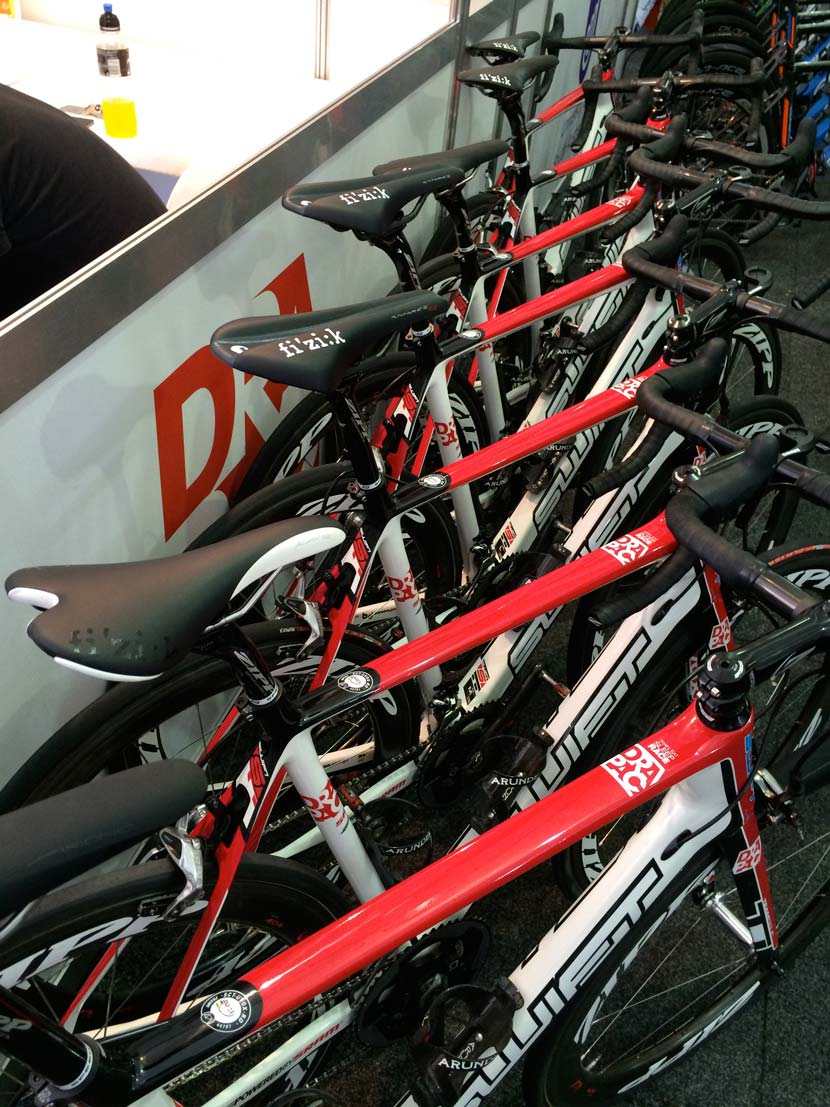
“I’ll mention a little bit about the Drapac business. Some of you know that I don’t often talk about my business but we first got involved in sustainability nearly 20 years ago. We were the first investment group in the world to be signatories and be endorsed by the United Nations as having signed a charter and actually contributing to the writing of that charter of what it means to be a socially responsible citizen.
“We’ve won national awards for sustainability and we’ve built the ‘greenest’ building in the world and I can honestly say that we’ve tried our best. We have a very strong agenda with our staff.
“One of my proud achievements was a project I did many years ago in a place called Lorimer. It still boasts the greatest number of kids who ride their bike to school and I insisted on designing that in 1997.
“Our business has largely gone off-shore and we are in the USA and at the moment we have nearly 50 medium to large scale projects in the USA. We will predominantly be selling communities. And the values of communities are no different to the values of a cycling community.
“What are the things which grow and promote spiritual and social capital? That’s another discussion…
“In closing, there are a few things I’d like to say.
“Drapac Cycling would like to continue to progress and grow as a team, obviously. We’d like to evolve our philosophy – there’s always room for improvement, we certainly can do it better. We can make a much bigger commitment to the riders.
“Hopefully we become recognised as one of the bright lights. I don’t think we’ve earned that right yet, but hopefully we become recognised as one of the bright lights in the new world of ethical leadership in sport.
“Hopefully we’ll also get invited back to do this race in 2015.
“But my closing comment is this: cycling is about people.
“There was a great speech by Bill Clinton where he said, ‘It’s the community, stupid.’
“It’s the bike riders. It’s the people, stupid.
“It’s not about medals. Medals are just a by-product.
“What is true success? Think about it. What’s real success? What’s worthy success? What does it mean to be truly successful?
“Transition and reintegration. Never forget those words. When boys come into a sport at 14 or 15, all they’re interested in is the self glorification of their own ego. It’s like feeding a child sweets, ‘Here, have some more!’
“It’s our obligation to teach them to have a sustainable and balanced approach to their lives otherwise we fail them. Sustainability in sport – in everything – is about being aware, responsible and accountable for everything you do in life.
“Thank you.”


